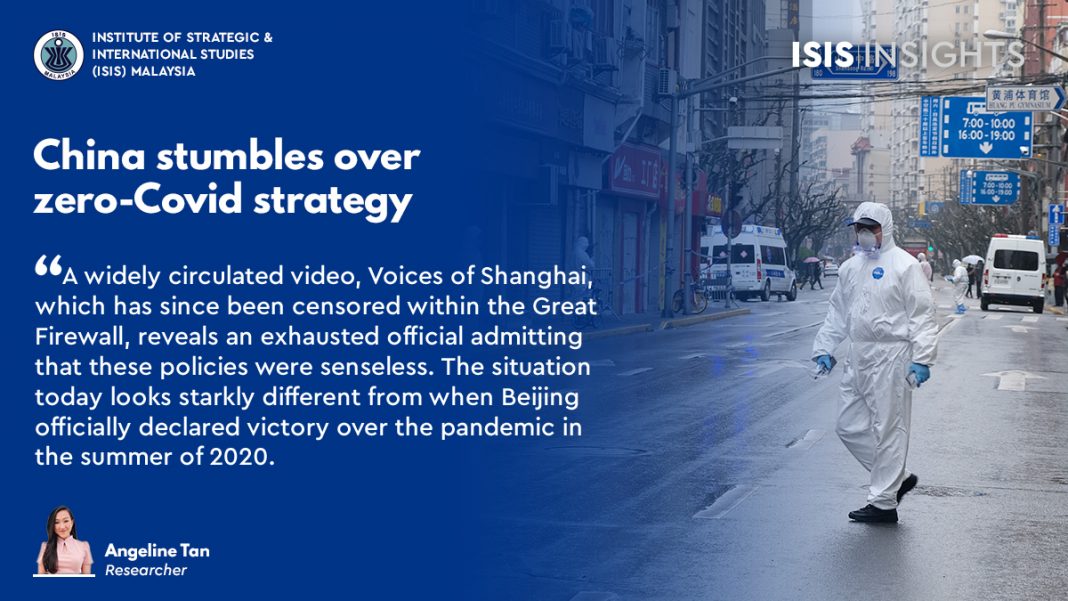Southeast Asia should court investors wary about dealing with extended lockdowns, fears of Beijing suffering Shanghai’s fate
IN February, the world watched in anticipation as Beijing opened the Winter Olympic Games. After two years of a strict zero-Covid strategy, the marginal opening of borders for an international sporting competition led many to believe that this may be the start of a gradual ease to China’s Covid policy. Yet a month later, China’s most affluent city – Shanghai – was placed in the most severe lockdown since the initial outbreak in Wuhan.
Reports of the Shanghainese shouting on their balconies out of hunger and anger, and of drone announcements asking residents to “control your soul’s desire for freedom. Do not open the window or sing” were nothing short of dystopian.
Food shortages, delayed medical care and the separation of children and parents in Shanghai led residents to protest online, criticising the government’s incompetence over the handling of the lockdown. A widely circulated video, Voices of Shanghai, which has since been censored within the Great Firewall, reveals an exhausted official admitting that these policies were senseless. These rare displays of public anger signal a clear shift in the city’s 25 million residents’ perception and trust in their government.
The situation today looks starkly different from when Beijing officially declared victory over the pandemic in the summer of 2020.
Beijing had prided its zero-Covid strategy as the superior method, measured by its relative lower deaths and infection rates. But while the world is transitioning into an endemic phase, China remains the only major country pursuing a strategy of containment.
For the most part, this strategy has spared China from the throes of the pandemic, but it may not be a useful tool to help transition to adapting to the reality of living with Covid.
Critics within and outside of China have raised questions about the sustainability of a zero-Covid strategy, especially as highly transmissible variants, such as Omicron, will likely continue to emerge. The challenge of containment is further complicated by Beijing’s rejection of Western-made mRNA vaccines, which have higher efficacy rates compared with Chinese-made vaccines.
As China’s leading industrial centre, Shanghai is integral to the global supply chain. This indefinite lockdown has spurred economic anxiety among investors and businesses. Even the “closed-loop management” – a bubble-like arrangement similar to the Winter Olympics’ system which allows for a few key industries to resume work – continues to face logistical challenges. While investors will not pull out of China so quickly, the government’s handling of the Shanghai lockdown will prompt businesses to consider diversifying their operations beyond China in the long term.
Despite the overwhelming economic consequences, the Chinese authorities continue to insist that a hard-line zero-Covid strategy is the key to Shanghai’s prosperity. Without strict lockdown measures, the potential large-scale infections will cripple the weak healthcare system.
The elderly is most at risk, as many are reluctant to be vaccinated. The situation in Shanghai led to a vigorous vaccination campaign targeting those above 60. In the first week of May, the National Health Commission reported 81.6% of the elderly were fully vaccinated, a significant progress from just one month earlier when less than half of the elderly were vaccinated. Improving vaccination rates will help contain the situation, but it does not point China towards an exit strategy.
There is no doubt that the Chinese economy will rebound once the pandemic is over, but the end seems far. On foreign relations, China may not find itself positioned as favourably with neighbouring partners, as it competes with the Biden administration that is actively forging closer ties with the region while Europe has also begun shifting its strategic attention.
In Southeast Asia, where Beijing’s vaccine diplomacy was once highly successful, this soft power strategy is fading in lustre as the region opens up. Instead, Southeast Asia is now turning its focus towards realising a robust post-Covid recovery and looking for partners that can help achieve its goals. The US-Asean summit on 12-13 May will be a key opportunity for Aseanto seek greater opportunities beyond China.
For instance, the EU through its Indo-Pacific strategy is targeting to conclude free trade agreements with several countries, including Malaysia. Other possible areas of cooperation include forging green alliances to combat climate change and establishing digital partnership agreements.
This is not to say that China is on track to lose its influence in Southeast Asia. The region is critical to China’s geostrategic interests and Asean states will continue to value China’s partnership. However, increased engagement by Western powers has only ramped up the competition. The Americans’ and Europeans’ respective Indo-Pacific strategies are expected to set higher standards and encourage greater transparency in the region.
While these strategies are not targeted at Beijing, they hope to shape its future behaviour. Essentially, increased US influence in the region will put greater pressure on China, especially on issues like maritime security. This will be advantageous for Malaysia as it enables us to better pursue a hedging strategy.
Despite the clear social, economic and geostrategic costs of a hard-line lockdown, perhaps the key concern by the Chinese authorities lies in political stability as the 20th party congress looms. It is then when President Xi Jinping is expected to take on an unprecedented third term, and nothing should overshadow the historic ascent.
Yet, while uncertainty persists, one thing is clear – this is the not the Chinese dream that Xi promised.
As the rest of the world adapts to a new normal, China seems stuck in old stuffy methods. China needs to move on from a strategy of containment to ensure a strong and sustained recovery. But doing so would force Beijing to admit that its zero-Covid strategy is not so superior after all.
This article also appeared in Forum, The Edge Malaysia Weekly, on May 16, 2022 – May 22, 2022.





